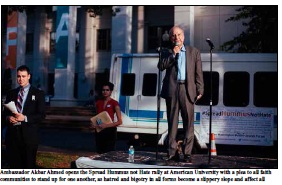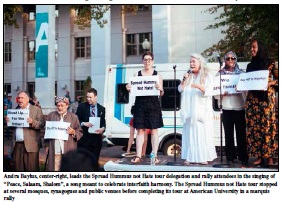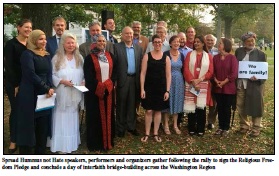The Spread Hummus Not Hate Rally Bridges Gaping Interfaith Divides, Soothes Election Season Tensions
By Patrick Burnett
Pictures by Mahnoor HussainandKatelyn Lamson

The 2016 presidential campaign has left many Americans shaken to their very core. More than half of Americans have reported this election being, at minimum, “a somewhat significant source of stress.” Meanwhile, women who have come forth recounting sexual assaults committed by one of the candidates are now being both insulted and threatened with lawsuits in retaliation . Young Muslims children have even suffered nightmares about one of the candidates taking them and their families away. The tension across America is simply palpable.
The US is experiencing a dark, challenging phase of history, with our pluralist core facing existential threats the likes of which have not been seen in generations. It is amidst these great trials and tribulations though that we as American pluralists must fight harder than ever for the vision of the Founding Fathers.

Channeling this fighting spirit, Ambassador Akbar Ahmed, the Ibn Khaldun Chair of Islamic Studies at American University in Washington, DC, in conjunction with his partners at the Spread Hummus not Hate tour, convened an interfaith rally on the Quad of American University on October 20, with the goal of inspiring all Americans to fight vigorously for our neighbors of all faiths and stand up against the ear-piercing voices of hatred and bigotry. And while the rally may not have drawn the numbers of a Trump or Clinton rally, its statements about America today may be just as impactful as what is said in an Ohio arena filled to capacity.
The third-annual Spread Hummus not Hate tour, organized by Walter Ruby of the Foundation for Ethnic Understanding and AndraBaylus of the Greater Washington Muslim-Jewish Forum, brought together leading members of the Muslim and Jewish communities of Greater Washington in an effort to bridge the divide that has emerged between these two communities globally. The tour made a number of stops around the Washington region, including at the University of Maryland, Farragut Square and a number of synagogues and mosques, spreading its hopeful message far and wide.

While every stop on the tour made a lasting impact on all engaged, organizers celebrated Ahmed’s rally at American University, which I had the privilege of emceeing, as the marquis event of the tour. The rally, combining the tour’s passionate efforts to restore the frayed relations between the Jewish and Muslim communities with an all-American celebration of our diverse religious traditions, became a beckoning call for all wishing to transcend this dark moment in American history. Framed by hummus and a generous donation of fragrant and flavorful Krishna Prasadam from the ISKCON Temple of DC, a Hare Krishna temple in Potomac, MD, the program encouraged attendees to celebrate peace and interfaith harmony through prayer, poetry, song and speeches.
Ahmed opened the program with a call to action for all faiths and cultures to stand up for one another. He remarked, “Today [the prejudice] is against Muslims, but tomorrow it could be anti-Semitism or against African-Americans or even Christians and others.” He called it the slippery slope. Ahmed also emphasized to this American audience the need to understand Islam and stop perceiving it as a violent faith. He educated the non-Muslims in the audience that the Bismillah declares God to be Rahman and Rahim, or merciful and compassionate, and that the Prophet Muhammed famously stated that the ink of the scholar is more sacred than the blood of the martyr. Ahmed recounted too the words of the renowned Sufi poet Rumi in emphasizing the Islamic emphasis on interfaith relations - “I go into the Muslim mosque/And the Jewish synagogue/And the Christian church/And I see one altar.”
Immediately following Ahmed’s remarks came the azzan, or call to prayer, and the reading of the Fatiha, or opening verse of the Qur’an, by Mohamed El-Idrissi of Dar al-Hijrah Mosque in Falls Church, VA and translated by Nadia Hassan of the Young Leaders Institute. Throughout the past year, Muslims have been scapegoated on the basis of their faith incessantly, and yet, here was a senior leader of a top Northern Virginia mosque in his full prayer robes standing on a stage publicly giving the azzan and Fatiha, with a leading Muslim figure in a hijab translating alongside him for the non-Muslims in the audience. This symbolic projection of American Muslim identity reemerged once again when El-Idrissi returned to the stage to sing “Tala’ al Badru ‘Alayna,” or the welcome song to Prophet Mohammed upon his entering Medina. As a non-Muslim, I am deeply inspired by such moments, as they reveal how, despite the heightened tensions towards American Muslims in recent years, there remains a vigor within the American Muslim community to stand up and continue educating their fellow Americans about themselves and their faith.
True to its purpose, the program was rich in moments of Jewish-Muslim unity. Among the opening events was a joint prayer for peace in the Middle East and beyond led by AU Jewish Chaplain Jason Benkendorf, the Executive Director of AU Hillel, and AU Muslim Chaplain Imam Imad-ad-Dean Ahmad, president of the Minaret of Freedom Institute. While the prayer was a strong statement in itself, the symbolic pinnacle came when AU students Susan Klau, representing AU Hillel and the Jewish Students Association, and BakhtawarMirjat, representing the AU Muslim Students Association, joined each other on stage in a Jewish prayer shawl and a hijab respectively to speak to the need, as Mirjat said, “to stand up for each other” given “the hateful rhetoric against us both on the national stage.” This powerful moment revealed that, even amidst strained relationships between Jewish and Muslim communities on college campuses torn over issues surrounding Israel/Palestine, the foundation for unity between these interlinked faith communities still exists underneath these tension.
Yet, as the ever-visionary Ahmed ensured, this rally was not only about the Jewish and Muslim communities of AU and Washington coming together, but it also served as a call to action to all faith communities to stand up for one another. The chaplain of AU, Rev. Mark Schaefer, a Methodist pastor, gave the opening prayer for the program. As the emcee of the program, I represented the American Catholic community both in planning and in coordinating the ceremonies. Manjula Kumar, a senior Hindu community leader in Greater Washington, spoke of the importance of building bridges through arts and culture. William Aiken, the director of public affairs for Soka Gakkai International-USA, represented the Buddhist community and its perspective on building bridges. Ananda Vrindavan, President of the ISKCON Temple, even led the crowd in a Hare Krishna chant to open the dinner, symbolizing the Vaishnava tradition, a major tradition within Hinduism.
In a program filled with soaring interfaith symbolism, perhaps most inspiring was the energy with which students in the audience took to heart the interfaith cause through the rally. Following the main program, students rushed to join speakers and performers in signing the Religious Freedom Pledge , a document which pledges signatories to “uphold and defend the freedom of conscience and religion of all individuals by rejecting and speaking out, without reservation, against bigotry, discrimination, harassment, and violence based on religion or belief.” Students who were instrumental in the organization of the rally reflected as well the strong feelings of hope and inspiration within the audience.
Katelyn Lamson, a senior in the AU School of International Service, remarked, “Indeed, it has been a particularly tumultuous year in politics with copious amounts of divisive rhetoric, so it was wonderful to see people set aside their differences for a few hours to stand together against hate. I hope the spirit of the rally will continue.” Anna Brosius, a junior in the AU School of International Service, reflected, “It was a historic moment for the university and the student groups involved, and I hope it will encourage further [bridge-building] activity on campus.”
Lest one view this rally as a kumbaya moment through-and-through, one must also be conscious of the risks taken in putting this rally together in today’s America. Behind the scenes, Ahmed and I frequently discussed the potential for disruptions to the program, whether over the Israel/Palestine conflict or in response to ever-heightening Islamophobia throughout the US. Ahmed and I were even concerned that someone could commit a violent act against the rally proceedings, prompting us to ensure AU Public Safety was on site and on call. In an environment where Muslim women have had their hijabs ripped off in public and terrorist plots against American mosques have been halted, who knew what could happen during such an open display of interfaith unity.
Mindful of such risks, as I watched the audience and the program that sunny Thursday afternoon work to counter the divisive, angry rhetoric that has characterized America throughout 2016, I could not help but think of the angel upon the statue of Thomas Jefferson at the University of Virginia, which, on a tablet inscribed “Religious Freedom, 1786”, spells out the names Allah, God, Jehovah and Brahma. This statue, one of the ultimate symbols of American pluralism, is a wellspring of interfaith inspiration that now more than ever must be taken to heart and reflected throughout our great nation. The spirit of that angel was shining bright on the campus of American University and in our Nation’s Capital last Thursday, and thanks to this rally, who is to say that spirit cannot spread its wings throughout America once again.
(The author is Program Coordinator to Ambassador Akbar Ahmed)

